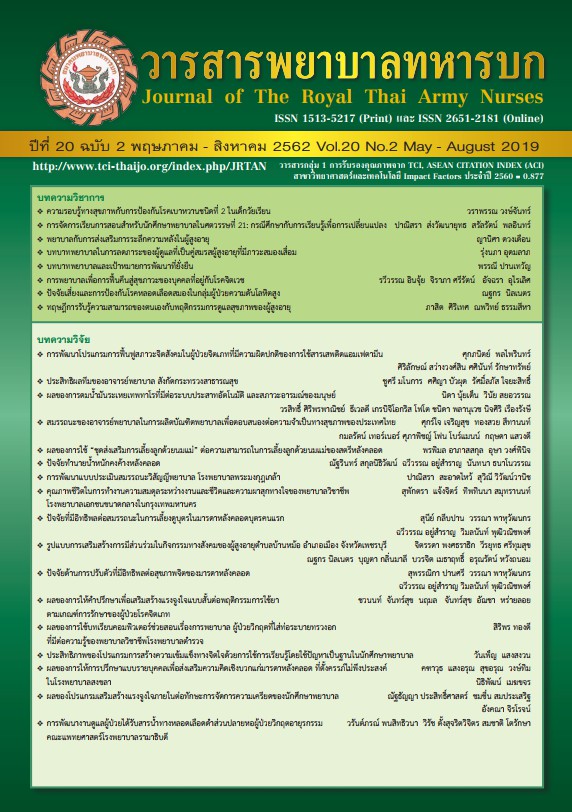Effects of a Smartphone Application on Knowledge Discharge Outcome among Patients with Mild Traumatic Brain Injury
Keywords:
knowledge, smartphone application, mild traumatic brain injury patientsAbstract
The purpose of this quasi-experimental research was to study the Effects of a smartphone application on knowledge discharge outcome among patients with mild traumatic brain injury. The sample group were 66 mild traumatic brain injury patients arrived at the Emergency Department. They were aged at least 18 years. The Glasgow Coma Scale equals to 15 points. The participants were purposive sampling into the controlled and experimental group, 33 for each group. The experimental group was received the suggestion for observed neurological system symptoms via the smartphone application. The controlled group was received the suggestion I accordance with the nursing standards. The data were collected by using the interview on the mild traumatic brain injury patients. All of the instruments were validated for content validity 0.98 by 5 professionals. When analyzed and compared the difference of knowledge scores within the group and between the controlled and experimental group, the Paired t-test and Independent t-test are used. The research results reveal that the experimental group has higher knowledge scores after the trial than before the trial with statistical significance 0.05 (t = 15.38, p < 0.001). The knowledge scores of the experimental group are higher than the controlled group with statistical significance at level of 0.05 (t = 3.88, p < 0.001).
Downloads
References
Ventura, T., Harrison-Felix, C., Carlson, N., DiGuiseppi, C., Gabella, B., Brown, A., … Whiteneck, G. Mortality After Discharge From Acute Care Hospitalization With Traumatic Brain Injury: A Population-Based Study. Archives of Physical Medicine and Rehabilitation 2010; 91(1), 20–29.
The Royal college of Neurological Surgeons of Thailand. Clinical Practice Guidelines for Traumatic Brain Injury; 2013 (in Thai)
Potaya S. The Glasgow Coma Scale. Journal of the Royal Thai Army Nurses 2018; 19(1), 30-38. (in Thai)
Emergency Department Data. Emergency Department Data a hospital in Nongbualamphu province. 2016 (in Thai)
West, T. a., Bergman, K., Biggins, M. S., French, B., Galletly, J., Hinkle, J. L., & Morris, J. Care of the patient with mild traumatic brain injury. American Association of Neuroscience Nurses and Association of Rehabilitation Nurses 2011; 1–35.
Plachaipiromsin S. Usages Trend of Mobile Application. Bangkok University 2011; 31(4), 110-115. (in Thai)
Pearkao C. The development of smart phone application for symptomatic observation of neurological system in mild traumatic brain injury patients. Faculty of Nursing, Khon Kaen University; 2018. (in Thai)
Hongkhoonthod A. Connectivism. Journal of Techno 2015; 6 (6-7), 24-27. (in Thai)
Laptavee B. Factors Predicting Monitoring and Preventive Care of Intracranial Hemorrhage among Mild Head Injury Patients in Thammasat University Hospital. Journal of science and technology 2015; 23(6), 1023-1032. (in Thai)
Worathipbenja P. The development mobile application learning management in classroom. The journal of Industrial Technology, Lampang Rajabhat University; 2015.
Kaewsanmuang K. Behaviours and Gratifications after Using Line Application of People Who are 25-45 Year old. Corporate Communication Management, Faculty of Journalism and Mass Communication Thammasat University; 2015. (in Thai)
Soomhirun R. A Literature Review Related to the Management for Reducing Readmission in Patients with Heart Failure. Thai Journal of Cardio-Thoracic Nursing 2009; 20(1), 17-32. (in Thai)
Downloads
Published
How to Cite
Issue
Section
License
บทความหรือข้อคิดเห็นใดใดที่ปรากฏในวารสารพยาบาลทหารบกเป็นวรรณกรรมของผู้เขียน ซึ่งบรรณาธิการหรือสมาคมพยาบาลทหารบก ไม่จำเป็นต้องเห็นด้วย
บทความที่ได้รับการตีพิมพ์เป็นลิขสิทธิ์ของวารสารพยาบาลทหารบก
The ideas and opinions expressed in the Journal of The Royal Thai Army Nurses are those of the authors and not necessarily those
of the editor or Royal Thai Army Nurses Association.






